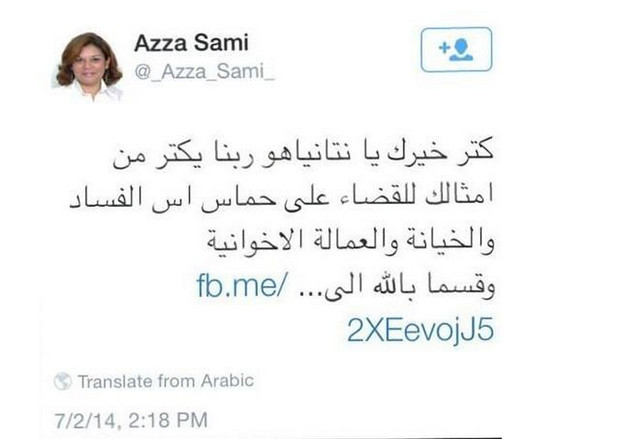15 july 2014
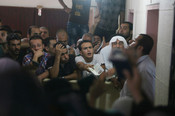
Palestinians at Rafah crossing wait to transport people wounded in the ongoing offensive against the Gaza Strip for treatment in Egypt, 12 July
Nearly two hundred Palestinians have been killed in Gaza in the past week, and while the death toll continues to rise, there remains no escape from the ongoing siege as Egypt maintains closure of Rafah crossing, the sole entry and exit point for the vast majority of Gaza’s 1.8 million residents.
United Nations secretary general Ban Ki-moon urged Egyptian President Abdul Fattah al-Sisi to open the border on Wednesday last week, after three days of intensive Israeli bombing had killed approximately ninety Palestinians.
On Thursday, Egyptian authorities opened the Rafah crossing only for Egyptians and Palestinians suffering critical injuries. Only eleven Palestinians passed the crossing before Egyptian authorities closed it again on Friday morning, according to the Ma’an News Agency. Egyptian authorities did not provide any reason for the closure.
Meanwhile, charity and medical workers report that they have been prevented from entering Gaza via Rafah crossing to deliver medical and food aid.
Thanking Netanyahu Meanwhile, much of the Egyptian media’s coverage of the Israeli raids on Gaza imitates the language of the Israeli government.
Popular television stations such as CBC use words like “terrorist targets” when describing the objects of Israeli airstrikes.
Nearly two hundred Palestinians have been killed in Gaza in the past week, and while the death toll continues to rise, there remains no escape from the ongoing siege as Egypt maintains closure of Rafah crossing, the sole entry and exit point for the vast majority of Gaza’s 1.8 million residents.
United Nations secretary general Ban Ki-moon urged Egyptian President Abdul Fattah al-Sisi to open the border on Wednesday last week, after three days of intensive Israeli bombing had killed approximately ninety Palestinians.
On Thursday, Egyptian authorities opened the Rafah crossing only for Egyptians and Palestinians suffering critical injuries. Only eleven Palestinians passed the crossing before Egyptian authorities closed it again on Friday morning, according to the Ma’an News Agency. Egyptian authorities did not provide any reason for the closure.
Meanwhile, charity and medical workers report that they have been prevented from entering Gaza via Rafah crossing to deliver medical and food aid.
Thanking Netanyahu Meanwhile, much of the Egyptian media’s coverage of the Israeli raids on Gaza imitates the language of the Israeli government.
Popular television stations such as CBC use words like “terrorist targets” when describing the objects of Israeli airstrikes.

Amany El-Khayat, a popular talk show figure, stated on Twitter that “Hamas is a Jihadist terrorist movement that does not differ much from ISIS. It attacks Israel and hides for the world to watch Israel strike at civilians”: |
The co-editor of the state-owned Al-Ahram newspaper, Azza Sami, expressed gratitude to Benjamin Netanyahu, the Israeli prime minister, saying “may there be [people] like you for taking on Hamas, the root of corruption, treason, and the Brotherhood agent,” referring to links between Hamas and the Muslim Brotherhood in Egypt, which was ousted from power in a military coup in July last year:
|
Before deleting her Twitter account, she also prayed for the death of all “Hamas members, and everyone who loves Hamas”:
|
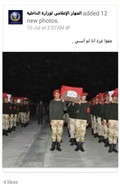
Blaming Hamas
The statements made by these media figures are not the first of their kind. Last year, incitement against Syrians and Palestinians was endemic as ousted president Muhammad Morsi was charged with communicating with Hamas and was often accused of giving electricity to Gaza.
Hamas, on the other hand, was accused of stealing electricity, wanting to take the Sinai peninsula, and of killing soldiers on the Rafah border in 2012.
The Egyptian interior ministry shared photographs of the funerals of the dead Egyptian soldiers on its Facebook page. The caption under the pictures read: “Sorry Gaza, we will not forget”:
The idea was that because Palestinians from Gaza allegedly “killed Egyptian soldiers in Rafah,” we cannot sympathize with them when Israel bombards the strip with airstrikes; they deserve it.
Rafah remains closed The Egyptian foreign ministry meanwhile released a statement on 8 July condemning Israel and expressing “extreme concern” over the escalation of violence in the Gaza Strip.
In the statement, Egypt calls for the “immediate and absolute abandonment of violence on both sides.” It calls for negotiations, and repeatedly states that UN Security Council resolutions must be respected and that Palestinians should work on calling for a two-state solution with East Jerusalem as Palestine’s capital.
Meanwhile, al-Sisi had a phone call on 8 July with Mahmoud Abbas, leader of the Palestinian Authority, reportedly discussing the situation on the ground. The phone call made the headlines of local newspapers.
Despite the supposed “condemnation,” the Egyptian authorities have kept Rafah closed. Since the 2013 coup which ousted Morsi, the Rafah crossing has remained shut down, intensifying the humanitarian crisis in Gaza as it created shortages in food, medical supplies and other basic necessities. The Egyptian military also destroyed hundreds of tunnels through which vital supplies were brought in to Gaza via Egypt.
Palestinians in Gaza have little hope that Egypt will provide any support or assistance.
“The people of Gaza cannot rely on anyone,” Islam Zendeh, a Gaza resident, said.
“How many times have the Arab leaders failed us throughout the years? They will continue to let us down,” Zendeh added.
“And how can a president who crushes his own people save another people that he and his soldiers keep under siege? How can we expect him to do anything for a group of people he considers terrorists?”
Jihad Abaza is a recent political science graduate from the American University in Cairo. She has also worked as a journalist.
The statements made by these media figures are not the first of their kind. Last year, incitement against Syrians and Palestinians was endemic as ousted president Muhammad Morsi was charged with communicating with Hamas and was often accused of giving electricity to Gaza.
Hamas, on the other hand, was accused of stealing electricity, wanting to take the Sinai peninsula, and of killing soldiers on the Rafah border in 2012.
The Egyptian interior ministry shared photographs of the funerals of the dead Egyptian soldiers on its Facebook page. The caption under the pictures read: “Sorry Gaza, we will not forget”:
The idea was that because Palestinians from Gaza allegedly “killed Egyptian soldiers in Rafah,” we cannot sympathize with them when Israel bombards the strip with airstrikes; they deserve it.
Rafah remains closed The Egyptian foreign ministry meanwhile released a statement on 8 July condemning Israel and expressing “extreme concern” over the escalation of violence in the Gaza Strip.
In the statement, Egypt calls for the “immediate and absolute abandonment of violence on both sides.” It calls for negotiations, and repeatedly states that UN Security Council resolutions must be respected and that Palestinians should work on calling for a two-state solution with East Jerusalem as Palestine’s capital.
Meanwhile, al-Sisi had a phone call on 8 July with Mahmoud Abbas, leader of the Palestinian Authority, reportedly discussing the situation on the ground. The phone call made the headlines of local newspapers.
Despite the supposed “condemnation,” the Egyptian authorities have kept Rafah closed. Since the 2013 coup which ousted Morsi, the Rafah crossing has remained shut down, intensifying the humanitarian crisis in Gaza as it created shortages in food, medical supplies and other basic necessities. The Egyptian military also destroyed hundreds of tunnels through which vital supplies were brought in to Gaza via Egypt.
Palestinians in Gaza have little hope that Egypt will provide any support or assistance.
“The people of Gaza cannot rely on anyone,” Islam Zendeh, a Gaza resident, said.
“How many times have the Arab leaders failed us throughout the years? They will continue to let us down,” Zendeh added.
“And how can a president who crushes his own people save another people that he and his soldiers keep under siege? How can we expect him to do anything for a group of people he considers terrorists?”
Jihad Abaza is a recent political science graduate from the American University in Cairo. She has also worked as a journalist.

Hundreds of thousands of Gazans are without water after Israeli air strikes that have wrecked the water and sewage system and the whole strip is threatened with a water crisis within days, aid agencies warned on Tuesday.
The eight-day assault has caused massive damage to infrastructure and destroyed at least 560 homes, the U.N. Relief and Works Agency for Palestine refugees (UNRWA) said.
"Within days, the entire population of the Strip may be desperately short of water," Jacques de Maio, head of the International Committee of the Red Cross (ICRC) delegation in Israel and the occupied territories, said in a statement.
If hostilities continue, just as temperatures soar in the region, "the question is not if but when an already beleaguered population will face an acute water crisis", he said.
"Water is becoming contaminated and sewage is overflowing, bringing a serious risk of disease," de Maio added.
Several municipal water engineeers have been killed in the conflict and Gaza's water service provider has suspended all field operations until the safety of its staff can be guaranteed, according to the ICRC, an independent aid agency whose teams have helped with emergency repairs.
"Water is a problem and it can quickly turn into a catastrophe," ICRC spokewoman Nada Doumani told a news briefing.
At least 184 Palestinians, most of them civilians, have been killed in the fighting, the worst flare-up in two years. The stated purpose of Israel's bombing is quieting cross-border rocket fire from Hamas militants fired into southern Israel.
UNTREATED SEWAGE
UNRWA said the destruction compounded the effects of eight years of Israel's blockade of the enclave.
"The water and sewage network is barely functioning, and with the sustained bombardment of the past 8 days, it's as good as destroyed," UNRWA spokesman Sami Mshasha told the briefing.
"We're looking at 90 million litres of untreated sewage that flows into the ocean every day because there is no electricity to treat it. Ninety percent of the drinking water is not fit for human consumption."
The World Health Organization (WHO), a U.N. agency, warned last week that health services in the occupied Palestinian territory were on the brink of collapse among severe shortages in medicines and fuel for hospital generators.
Hamas militants fired volleys of rockets from the Gaza Strip on Tuesday, drawing a threat by Israel to abandon an Egyptian-proposed truce it had unilaterally accepted.
"We are extremely worrried as UNRWA that if the ceasefire being negotiated today does not succeed, then the much-talked about ground offensive might unfold and we might see an Israeli military incursion into Gaza," Mshasha said.
If there is a truce, the ICRC hopes for better access to the increasing numbers of casualties, spokeswoman Doumani said.
The ICRC is "documenting violations of international humanitarian law" in the conflict, she said.
U.N. human rights chief Navi Pillay on Friday voiced serious doubts that Israeli's military operation against Gaza complied with international law banning the targeting of civilians, and called on both sides to respect the rules of war. (Reporting by Stephanie Nebehay; editing by Andrew Roche)
The eight-day assault has caused massive damage to infrastructure and destroyed at least 560 homes, the U.N. Relief and Works Agency for Palestine refugees (UNRWA) said.
"Within days, the entire population of the Strip may be desperately short of water," Jacques de Maio, head of the International Committee of the Red Cross (ICRC) delegation in Israel and the occupied territories, said in a statement.
If hostilities continue, just as temperatures soar in the region, "the question is not if but when an already beleaguered population will face an acute water crisis", he said.
"Water is becoming contaminated and sewage is overflowing, bringing a serious risk of disease," de Maio added.
Several municipal water engineeers have been killed in the conflict and Gaza's water service provider has suspended all field operations until the safety of its staff can be guaranteed, according to the ICRC, an independent aid agency whose teams have helped with emergency repairs.
"Water is a problem and it can quickly turn into a catastrophe," ICRC spokewoman Nada Doumani told a news briefing.
At least 184 Palestinians, most of them civilians, have been killed in the fighting, the worst flare-up in two years. The stated purpose of Israel's bombing is quieting cross-border rocket fire from Hamas militants fired into southern Israel.
UNTREATED SEWAGE
UNRWA said the destruction compounded the effects of eight years of Israel's blockade of the enclave.
"The water and sewage network is barely functioning, and with the sustained bombardment of the past 8 days, it's as good as destroyed," UNRWA spokesman Sami Mshasha told the briefing.
"We're looking at 90 million litres of untreated sewage that flows into the ocean every day because there is no electricity to treat it. Ninety percent of the drinking water is not fit for human consumption."
The World Health Organization (WHO), a U.N. agency, warned last week that health services in the occupied Palestinian territory were on the brink of collapse among severe shortages in medicines and fuel for hospital generators.
Hamas militants fired volleys of rockets from the Gaza Strip on Tuesday, drawing a threat by Israel to abandon an Egyptian-proposed truce it had unilaterally accepted.
"We are extremely worrried as UNRWA that if the ceasefire being negotiated today does not succeed, then the much-talked about ground offensive might unfold and we might see an Israeli military incursion into Gaza," Mshasha said.
If there is a truce, the ICRC hopes for better access to the increasing numbers of casualties, spokeswoman Doumani said.
The ICRC is "documenting violations of international humanitarian law" in the conflict, she said.
U.N. human rights chief Navi Pillay on Friday voiced serious doubts that Israeli's military operation against Gaza complied with international law banning the targeting of civilians, and called on both sides to respect the rules of war. (Reporting by Stephanie Nebehay; editing by Andrew Roche)
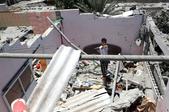
Israeli human rights organization B’Tselem has issued an information sheet stating that the interpretation presented by the Israeli forces spokesperson -- that it is enough for a person to be involved in a military activity to render his home and his neighbors’ homes legitimate military targets without having to prove any connection between his activity and the house in which he and his family live -- is unfounded and illegal.
The organization added, according to WAFA Palestinian News & Info Agency's recent report:
"It is not a coincidence that the number of uninvolved civilians killed or injured by these bombings is growing. The law is meant to protect civilians and, unsurprisingly, violating it has lethal consequences. Euphemisms such as 'surgical strikes' or 'operational infrastructure' cannot hide the facts: illegal attacks of homes, which constitute punitive home demolition from the air, come at a dreadful cost in human life."
The fact sheet details a discussion which would cast considerable doubt over the legality of Israel’s targeting of what it claims were houses belonging to Hamas operatives.
International humanitarian law defines a military target as follows: “[…] military objectives are limited to those objects which by their nature, location, purpose or use make an effective contribution to military action and whose total or partial destruction, capture or neutralization, in the circumstances ruling at the time, offers a definite military advantage.” (Article 52 (2), Protocol I Additional to the Fourth Geneva Convention)
WAFA further reports that, according to the official interpretation of the International Committee of the Red Cross, objectives which, by their nature, make an effective contribution to hostile military action – such as weapon storage, military bases and communication centers used by the military – are considered military targets.
However, although civilian sites may serve as military bunkers or headquarters, and accordingly become legitimate military targets, the law states that if any doubt arises as to the use of a civilian site and its effective contribution to hostile military actions, it must be considered civilian.
Attacking any such structure must provide a definite military advantage.
Although the actuality of Gaza civilian houses contributed effectively to hostile military action was in fact doubted, Israeli forces targeted them anyway.
B'Tselem defines the aim of international humanitarian law as being:
"...to minimize harm to civilians under warfare and to restrict the warring parties... it is not open to any and all interpretations. The word of the law must be interpreted in its original spirit, in keeping with its overreaching aim: to provide maximum protection to civilians."
According to the organization, the Israeli army spokesperson, over the course of the current operation, has changed the wording of statements concerning the bombings on Gaza, in an apparent attempt to retroactively match his reports of reality to the requirements of the law.
First statement (July 8): "Among the targets attacked were four homes of activists in the Hamas terror organization who are involved in terrorist activity and direct and carry out high-trajectory fire towards Israel…".
The next day, another statement was issued which reported that the military had attacked additional homes of Hamas activists "which functioned as command and control infrastructure for the organization' or as 'a control center for advancing terrorism".
The same evening, the spokesperson stopped reporting that homes were destroyed, stating instead that "the operational infrastructure of a senior Hamas functionary was attacked".
The organization added, according to WAFA Palestinian News & Info Agency's recent report:
"It is not a coincidence that the number of uninvolved civilians killed or injured by these bombings is growing. The law is meant to protect civilians and, unsurprisingly, violating it has lethal consequences. Euphemisms such as 'surgical strikes' or 'operational infrastructure' cannot hide the facts: illegal attacks of homes, which constitute punitive home demolition from the air, come at a dreadful cost in human life."
The fact sheet details a discussion which would cast considerable doubt over the legality of Israel’s targeting of what it claims were houses belonging to Hamas operatives.
International humanitarian law defines a military target as follows: “[…] military objectives are limited to those objects which by their nature, location, purpose or use make an effective contribution to military action and whose total or partial destruction, capture or neutralization, in the circumstances ruling at the time, offers a definite military advantage.” (Article 52 (2), Protocol I Additional to the Fourth Geneva Convention)
WAFA further reports that, according to the official interpretation of the International Committee of the Red Cross, objectives which, by their nature, make an effective contribution to hostile military action – such as weapon storage, military bases and communication centers used by the military – are considered military targets.
However, although civilian sites may serve as military bunkers or headquarters, and accordingly become legitimate military targets, the law states that if any doubt arises as to the use of a civilian site and its effective contribution to hostile military actions, it must be considered civilian.
Attacking any such structure must provide a definite military advantage.
Although the actuality of Gaza civilian houses contributed effectively to hostile military action was in fact doubted, Israeli forces targeted them anyway.
B'Tselem defines the aim of international humanitarian law as being:
"...to minimize harm to civilians under warfare and to restrict the warring parties... it is not open to any and all interpretations. The word of the law must be interpreted in its original spirit, in keeping with its overreaching aim: to provide maximum protection to civilians."
According to the organization, the Israeli army spokesperson, over the course of the current operation, has changed the wording of statements concerning the bombings on Gaza, in an apparent attempt to retroactively match his reports of reality to the requirements of the law.
First statement (July 8): "Among the targets attacked were four homes of activists in the Hamas terror organization who are involved in terrorist activity and direct and carry out high-trajectory fire towards Israel…".
The next day, another statement was issued which reported that the military had attacked additional homes of Hamas activists "which functioned as command and control infrastructure for the organization' or as 'a control center for advancing terrorism".
The same evening, the spokesperson stopped reporting that homes were destroyed, stating instead that "the operational infrastructure of a senior Hamas functionary was attacked".
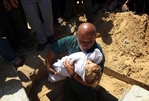
Burial of child killed by Israeli bombardment of Gaza
Hamas and Islamic Jihad stated Tuesday that they were never consulted over the terms of a proposed truce with Israel that was drafted by Egypt. The Israeli prime minister stated that if Hamas does not accept the ceasefire proposal, it will be legitimate for Israel to broaden its military operation against the Gaza Strip.
"To avoid confusion and to be clear with our people, al-Qassam Brigades confirm that we haven't been contacted by any official or unofficial entities about terms of this alleged initiative," said the Azz a Din al Qassam brigades in a statement.
"If what has been circulated is true, this initiative means kneeling and submissiveness and so we completely refuse it and to us, it's not worth the ink used in writing it," the military organization added.
Senior Islamic Jihad official Khalid al-Batsh welcomed Egypt's role, but said that there was only contact between Egypt and Israel. He stressed the Islamic Jihad was never consulted.
"Initiatives shouldn't be proposed through media outlets, but rather through the obvious channels, which are resistance factions and their leaders”, al-Batsh stated.
Deputy secretary-general of the group, Ziad al-Nakhalah, said late Monday that there couldn't be a ceasefire agreement without guarantees to end Israeli aggression and the blockade on Gaza.
"We are open to any initiative, but rocket fire won't stop unless a real and appropriate agreement is reached," he added.
Israel's security cabinet on Tuesday accepted the Egyptian ceasefire proposal, a government spokesman said, after a week of deadly bombings on Gaza which killed over 180 Palestinians.
"The cabinet has decided to accept the Egyptian initiative for a ceasefire starting 9am today," Ofir Gendelman, spokesman for Prime Minister Benjamin Netanyahu, said on Twitter.
"We agreed to the Egyptian proposal in order to give an opportunity for the demilitarization of the (Gaza) Strip - from missiles, from rockets and from tunnels - through diplomatic means," he told reporters during an earlier press conference with German Foreign Minister Frank-Walter Steinmeier.
The Prime Minister added, "but if Hamas does not accept the ceasefire proposal, as would now seem to be the case, Israel would have all international legitimacy to broaden the military operation to achieve the required quiet."
See: Egypt Claims to Have Brokered Ceasefire Agreement; Palestinian Factions Say They Were Not Consulted
Hamas and Islamic Jihad stated Tuesday that they were never consulted over the terms of a proposed truce with Israel that was drafted by Egypt. The Israeli prime minister stated that if Hamas does not accept the ceasefire proposal, it will be legitimate for Israel to broaden its military operation against the Gaza Strip.
"To avoid confusion and to be clear with our people, al-Qassam Brigades confirm that we haven't been contacted by any official or unofficial entities about terms of this alleged initiative," said the Azz a Din al Qassam brigades in a statement.
"If what has been circulated is true, this initiative means kneeling and submissiveness and so we completely refuse it and to us, it's not worth the ink used in writing it," the military organization added.
Senior Islamic Jihad official Khalid al-Batsh welcomed Egypt's role, but said that there was only contact between Egypt and Israel. He stressed the Islamic Jihad was never consulted.
"Initiatives shouldn't be proposed through media outlets, but rather through the obvious channels, which are resistance factions and their leaders”, al-Batsh stated.
Deputy secretary-general of the group, Ziad al-Nakhalah, said late Monday that there couldn't be a ceasefire agreement without guarantees to end Israeli aggression and the blockade on Gaza.
"We are open to any initiative, but rocket fire won't stop unless a real and appropriate agreement is reached," he added.
Israel's security cabinet on Tuesday accepted the Egyptian ceasefire proposal, a government spokesman said, after a week of deadly bombings on Gaza which killed over 180 Palestinians.
"The cabinet has decided to accept the Egyptian initiative for a ceasefire starting 9am today," Ofir Gendelman, spokesman for Prime Minister Benjamin Netanyahu, said on Twitter.
"We agreed to the Egyptian proposal in order to give an opportunity for the demilitarization of the (Gaza) Strip - from missiles, from rockets and from tunnels - through diplomatic means," he told reporters during an earlier press conference with German Foreign Minister Frank-Walter Steinmeier.
The Prime Minister added, "but if Hamas does not accept the ceasefire proposal, as would now seem to be the case, Israel would have all international legitimacy to broaden the military operation to achieve the required quiet."
See: Egypt Claims to Have Brokered Ceasefire Agreement; Palestinian Factions Say They Were Not Consulted
Hamas TV: Drone brought down in central Gaza
Hamas' Al-Aqsa TV reported Monday that Palestinian factions had shot down an Israeli drone flying over the central Gaza Strip.
Hamas' Al-Aqsa TV reported Monday that Palestinian factions had shot down an Israeli drone flying over the central Gaza Strip.

Prime Minister Benjamin Netanyahu pledged Tuesday to ramp up Israel's military campaign against Gaza, after an Egyptian truce plan failed to end eight days of cross-border fire.
"This would have been better resolved diplomatically, that’s what we tried to do when we accepted the Egyptian truce proposal today," he said.
"But Hamas leaves us no choice but to expand and intensify the campaign against it," Netanyahu said.
"That’s how we will act till we achieve our goal of bringing quiet to Israel’s citizens, while significantly harming the terror group," he said of Hamas which controls Gaza.
Netanyahu's remarks came shortly after the army and emergency services announced an Israeli civilian was killed by a projectile that hit near the Erez crossing into the Gaza Strip, the first in the conflict in which 194 Palestinians have been killed by Israeli strikes since July 8.
In televised remarks, Netanyahu also addressed criticism from members of his cabinet earlier in the day, when Foreign Minister Avidgor Lieberman slammed the Israeli acceptance of the Egyptian truce and Netanyahu's "hesitance", saying Israel should conquer Gaza and expel Hamas from it.
"These are moments when decisions must be made coolly and with patience, not hastily or noisily," Netanyahu said.
"I’m determined to do the right thing, I know you trust me to ignore the background noises and focus on the main mission to safeguard you and your lives."
Shortly after Netanyahu's remarks, his bureau announced he had fired deputy defense minister Danny Danon, a firebrand member of his Likud party, who became a vocal critic of Netanyahu during the operation, calling him a "failure" and saying Hamas was controlling the conflict.
"It is inconceivable that the deputy defence minister will attack the country's leadership leading the campaign," a statement read.
"The severe remarks show a lack of responsibility ... and even are used by Hamas terror group to slam the government, as evident in their communication networks," it said.
Meanwhile, speculation remained rife over a possible ground incursion, with no conclusive remarks from Israeli officials but a pledge to carry one out if the need arose.
"The army renewed its attacks and will increase them as much as necessary, in the air, sea and land, according to our orders," the armed forces chief of staff, Lieutenant General Benny Gantz, said after Netanyahu's remarks.
"This would have been better resolved diplomatically, that’s what we tried to do when we accepted the Egyptian truce proposal today," he said.
"But Hamas leaves us no choice but to expand and intensify the campaign against it," Netanyahu said.
"That’s how we will act till we achieve our goal of bringing quiet to Israel’s citizens, while significantly harming the terror group," he said of Hamas which controls Gaza.
Netanyahu's remarks came shortly after the army and emergency services announced an Israeli civilian was killed by a projectile that hit near the Erez crossing into the Gaza Strip, the first in the conflict in which 194 Palestinians have been killed by Israeli strikes since July 8.
In televised remarks, Netanyahu also addressed criticism from members of his cabinet earlier in the day, when Foreign Minister Avidgor Lieberman slammed the Israeli acceptance of the Egyptian truce and Netanyahu's "hesitance", saying Israel should conquer Gaza and expel Hamas from it.
"These are moments when decisions must be made coolly and with patience, not hastily or noisily," Netanyahu said.
"I’m determined to do the right thing, I know you trust me to ignore the background noises and focus on the main mission to safeguard you and your lives."
Shortly after Netanyahu's remarks, his bureau announced he had fired deputy defense minister Danny Danon, a firebrand member of his Likud party, who became a vocal critic of Netanyahu during the operation, calling him a "failure" and saying Hamas was controlling the conflict.
"It is inconceivable that the deputy defence minister will attack the country's leadership leading the campaign," a statement read.
"The severe remarks show a lack of responsibility ... and even are used by Hamas terror group to slam the government, as evident in their communication networks," it said.
Meanwhile, speculation remained rife over a possible ground incursion, with no conclusive remarks from Israeli officials but a pledge to carry one out if the need arose.
"The army renewed its attacks and will increase them as much as necessary, in the air, sea and land, according to our orders," the armed forces chief of staff, Lieutenant General Benny Gantz, said after Netanyahu's remarks.
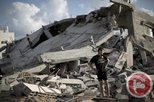
The UN aid agency for Palestinians on Tuesday described the damage wrought by Israel's air offensive on Gaza as "immense", with more than 500 homes razed.
"The level of human losses and destruction in Gaza is really immense," said UNWRA spokesman Sami Mshasha.
"According to our latest figure, we are talking about 174 killed and well over 1,100 injured. This number will increase. The numbers are increasing by hours," he told reporters.
"A good number of those killed and injured are women and children. That is a cause of concern for UNRWA," he added.
The death toll on Tuesday had risen to 192, according to local officials in Gaza.
Mshasha said that 560 homes had been totally destroyed, while thousands of buildings had suffered damage.
Mshasha said that 47 UNRWA facilities had also been damaged by bombing.
A total of 17,000 people had found refuge in 20 schools run by the UN agency, which has sent their GPS coordinates to Israeli authorities.
He called on the warring sides to respect UN buildings.
Israel on Tuesday announced it had accepted an Egyptian ceasefire plan after a week of bombing, but the move was rejected by the Palestinian Islamist movement Hamas which controls the territory and has fired a hail of rockets at Israel.
Without a halt to the fighting, Mshasha said, the risk of an Israeli ground assault on the enclave remains, raising the specter of even greater death and destruction.
In a separate statement, the International Committee of the Red Cross said the bombing had devastated Gaza's water supply.
"Hundreds of thousands of people in Gaza are now without water. Within days, the entire population of the Strip may be desperately short of water," said Jacques de Maio, who heads ICRC operations in Israel and the Palestinian territories.
"Water and electrical services are also affected as a result of the current hostilities. If they do not stop, the question is not if but when an already beleaguered population will face an acute water crisis," he said in a statement.
Fighting is also preventing technicians from carrying out essential repairs.
Following the deaths of several municipal water technicians, Gaza's water service provider has suspended all field operations until the safety of its staff can be guaranteed, the ICRC said.
"Gaza's water system has been deteriorating for years. The latest attacks are the last straw. Safe drinking water is becoming increasingly scarce in the Strip, just as temperatures are soaring," said ICRC water and sanitation expert Guillaume Pierrehumbert.
"Water is becoming contaminated and sewage is overflowing, bringing a serious risk of disease."
"The level of human losses and destruction in Gaza is really immense," said UNWRA spokesman Sami Mshasha.
"According to our latest figure, we are talking about 174 killed and well over 1,100 injured. This number will increase. The numbers are increasing by hours," he told reporters.
"A good number of those killed and injured are women and children. That is a cause of concern for UNRWA," he added.
The death toll on Tuesday had risen to 192, according to local officials in Gaza.
Mshasha said that 560 homes had been totally destroyed, while thousands of buildings had suffered damage.
Mshasha said that 47 UNRWA facilities had also been damaged by bombing.
A total of 17,000 people had found refuge in 20 schools run by the UN agency, which has sent their GPS coordinates to Israeli authorities.
He called on the warring sides to respect UN buildings.
Israel on Tuesday announced it had accepted an Egyptian ceasefire plan after a week of bombing, but the move was rejected by the Palestinian Islamist movement Hamas which controls the territory and has fired a hail of rockets at Israel.
Without a halt to the fighting, Mshasha said, the risk of an Israeli ground assault on the enclave remains, raising the specter of even greater death and destruction.
In a separate statement, the International Committee of the Red Cross said the bombing had devastated Gaza's water supply.
"Hundreds of thousands of people in Gaza are now without water. Within days, the entire population of the Strip may be desperately short of water," said Jacques de Maio, who heads ICRC operations in Israel and the Palestinian territories.
"Water and electrical services are also affected as a result of the current hostilities. If they do not stop, the question is not if but when an already beleaguered population will face an acute water crisis," he said in a statement.
Fighting is also preventing technicians from carrying out essential repairs.
Following the deaths of several municipal water technicians, Gaza's water service provider has suspended all field operations until the safety of its staff can be guaranteed, the ICRC said.
"Gaza's water system has been deteriorating for years. The latest attacks are the last straw. Safe drinking water is becoming increasingly scarce in the Strip, just as temperatures are soaring," said ICRC water and sanitation expert Guillaume Pierrehumbert.
"Water is becoming contaminated and sewage is overflowing, bringing a serious risk of disease."
Truce violations List of names Pictures of martyrs
Days: Aug: 26 - 25 - 24 - 23 - 22 - 21 - 20 - 19 - 18 - 17 - 16 - 15 - 14 - 13 - 12 - 11 - 10 - 9 - 8 - 7 - 6 - 5 - 4 - 3 - 2 - 1
July: 31 - 30 - 29 - 28 - 27 - 26 - 25 - 24 - 23 - 22 - 21 - 20 - 19 - 18 - 17 - 16 - 15 - 14 - 13 - 12 - 11 - 10 - 9 - 8
Days: Aug: 26 - 25 - 24 - 23 - 22 - 21 - 20 - 19 - 18 - 17 - 16 - 15 - 14 - 13 - 12 - 11 - 10 - 9 - 8 - 7 - 6 - 5 - 4 - 3 - 2 - 1
July: 31 - 30 - 29 - 28 - 27 - 26 - 25 - 24 - 23 - 22 - 21 - 20 - 19 - 18 - 17 - 16 - 15 - 14 - 13 - 12 - 11 - 10 - 9 - 8
